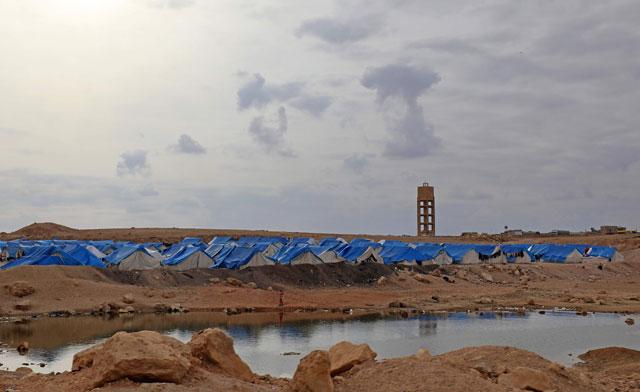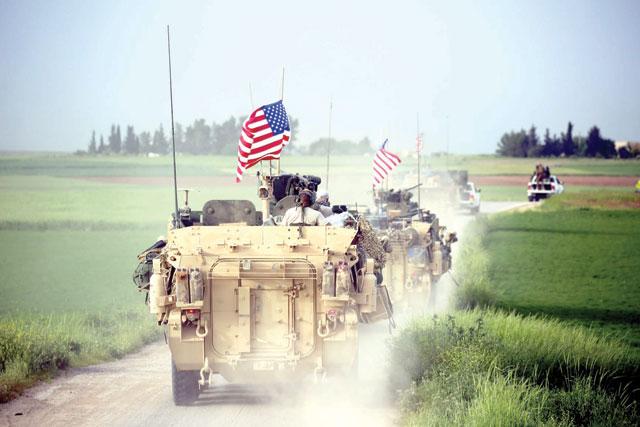You are here
Judging militants in Syrian Kurdistan: political hot potato
By AFP - May 17,2018 - Last updated at May 17,2018

A general view shows a camp where detained Daesh families are held in Ain Issa in the Syrian northern Kurdish region on February 15 (AFP photo)
Qamishli, Syria — Shunned by both their Western governments and their Kurdish jailers, foreign men and women who joined Daesh are lingering in detention in northern Syria.
When the militant group’s self-proclaimed caliphate crumbled in 2017, the Kurdish forces that govern swathes of Syria's north rounded up thousands of Daesh fighters from 40 different countries.
It was up to local courts to try them, but so far only native hardliners have been sentenced.
Last year, judge Rasho Kanaan and his colleagues tried more than 800 alleged militants, all Syrian, in the Kurdish-run town of Qamishli.
Sitting in his office in an unremarkable rectangular building, Kanaan says he is not keen to process the foreigners.
"We already have plenty of other prisoners to manage," Kanaan tells AFP.
He says the legal system in northern Syria, which operates independently of regime institutions based in Damascus, "is made to judge locals, not foreigners".
The Kurdish People’s Protection Units (YPG), the military force that controls much of northern Syria, is more direct.
“All these foreign prisoners are a burden for us,” YPG spokesman Nuri Mahmoud says.
But the Kurds appear stuck with them.
With European public opinion hostile to repatriating homegrown extremists, governments are not eager to reclaim radicalised citizens detained abroad.
“Denmark, Canada and Switzerland say they are ready to take women and children. But on condition that it’s not done publicly,” says Nadim Houry, director of terrorism and counterterrorism for Human Rights Watch.
The watchdog estimates there are thousands of foreigners in Kurdish detention, including around 800 women and 1,200 children.
According to the Kurds, only Russia and Indonesia have agreed to take back their detainees, mostly women and children.
Prisoners ‘not priority’
France insists any adults among the more than 40 French nationals held by Kurdish authorities should be tried where they are, so long as they face a “fair trial”.
Among them is Thomas Barnouin, an alleged Daesh fighter who was captured in December by Syrian Kurdish forces.
The 36-year-old “was part of the most radical branch of Daesh”, according to a source close to his case.
“Barnouin and several others are potential dangers and also mines of information on Daesh,” the source adds.
Kurdish forces also captured British citizens Alexanda Amon Kotey and El Shafee El Sheikh, part of the infamous “Beatles” quartet accused of beheading around 20 hostages.
But Kurdish officials say they would rather pass off the foreigners to their own countries so they can focus on defending their territory from their arch-enemy Ankara.
“Our priority is not the prisoners — it’s Turkey,” says Mahmoud.
They feel betrayed after Western powers, namely the US, failed to halt a Turkish-led offensive on the Kurdish enclave of Afrin earlier this year.
“Why continue to keep foreign prisoners, particularly Western ones, if their countries don’t support us against the Turks?” asks another local official.
Could the Kurds’ frustration result in thousands of foreign militants being let loose?
“Our position remains to investigate and process these files, in cooperation with the authorities” of prisoners’ home countries, says Khaled Issa, a Kurdish representative in France.
Reconciliation rules
The overwhelming number of both foreign and local suspects means that those that are tried do not get due process.
The accused appear directly in front of judges without a local lawyer or an appeals process.
If found guilty, they are generally sentenced to between five and seven years in prison, with the most extreme facing 20 years.
But HRW says the punishments are often reduced for good behaviour or by amnesties. Sentences can also be cut short if the accused belongs to an influential Syrian Arab tribe, which acts as a guarantor, promising the ex-militant will stay on the right side of the law.
“The Kurds have to manage a mosaic of different communities on their territory,” says HRW’s Houry.
The guiding principle, he says, is reconciliation: “We must all live together — we therefore have no other choice.”
Finding proof of active Daesh membership is difficult, especially when it comes to the hundreds of female suspects, who include women from Russia, Tunisia and Turkey.
While few have seen combat, some worked in police and religious units. Many married Daesh fighters and have two or three children, who are technically stateless.
“Last year, we judged 10 [Syrian women]. We released half, the other half were sentenced to less than 10 years,” says Kanaan.
The rulings are in stark contrast to those in the West, where sentences for terror-linked offences are only getting tougher.
As foreign fighters linger in detention, some have suggested using them as leverage.
“The Kurds can use this as a bargaining chip to get aid,” says Fabrice Balanche, an academic expert on Syria.
But time may be running out.
With the fight against Daesh ending, Kurds worry their US ally will abandon them — a fear compounded by President Donald Trump’s insistence on withdrawing from Syria.
“Without American support, the Kurds cannot hold back the Turks or another well-equipped army,” says Balanche.
If the Kurdish administration in northern Syria subsequently collapses, what could happen to foreign prisoners?
Such questions were already being raised in the aftermath of Afrin’s capture by Turkish-backed rebels.
While experts believe there were few, if any, foreign militants held in Kurdish-run prisons there, local detainees seem to have vanished without a trace, with Kurdish officials saying they have no knowledge of their fate.
Related Articles
QAMISHLI, Syria — Kurdish-led forces in northern Syria on Thursday announced the capture of French extremist Adrien Guihal, known as the voi
QAMISHLI, Syria — Syria's Kurds fear the steadfast ally they found in the US to successfully take on the Daesh terror group militants may no
AIN ISSA, Syria — Syria's Kurds on Monday called for an international court to be set up in the country to try suspected Daesh group extremi
















